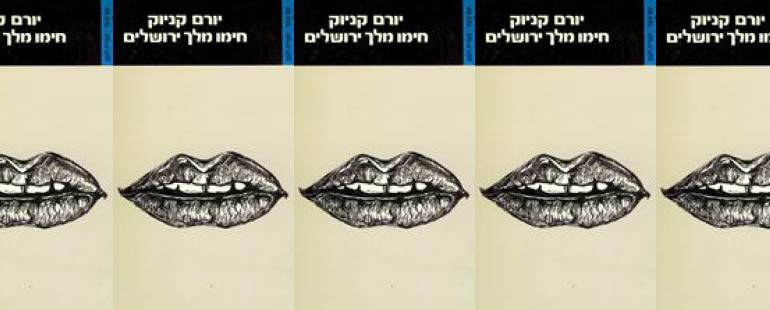Parsing Identity in Grief in Himmo, King of Jerusalem

It was a brutally cold afternoon when I walked into the public library, my cousin’s newborn strapped to my chest, escaping the cold as I searched for ways to pass the time while babysitting. I wandered the shelves, looking for something light and fluffy with which to pass the time. Instead, as I walked past an impressive selection of Hebrew titles, my eyes fell on a book I’d been meaning to read for years: Himmo, King of Jerusalem by celebrated Israeli author Yoram Kaniuk.
This 1966 novel is one of the author’s lesser known and oft-forgotten works. The only reason I even knew it existed was because of a maligned film adaptation, the trailer for which I’d come across on an Israeli cable channel as a child. Set in an abandoned Jerusalem monastery turned makeshift field hospital during the 1948 war, I expected it to be a heavy, difficult read. But two hours later, when the baby started to stir, I looked up, in a daze. I had lost myself in this strange, exceptional story, so otherworldly while also being entirely familiar. It is short and nearly plotless, and yet my brain was buzzing with all it had to say.
The book follows Hamutal, a young girl whose military service has her assigned as a nurse in the crumbling hospital, tending to severely injured soldiers who are deemed too far-gone to be rehabilitated back into combat. A transplant from the Galilee whose boyfriend was killed in battle, Hamutal develops a friendship with an elderly nun who teaches her the historical significance of the monastery and the city around it, a warm yet wary rapport with her patients, and an intensifying obsession with one incoming patient: Himmo, who is said to have once been the gorgeous Casanova of Jerusalem, and who has lost all limbs as well as his eyes, his body lacerated and his medical chart—which allows the unlimited administration of tranquilizers—is adorned by a handwritten inscription that reads, “The future is behind him, so who cares.”
Trapped in a liminal space between the living and the dead, Hamutal learns more about life in the yet-unborn State of Israel than she ever could as a carefree civilian. Through conversations with Himmo’s brother, whose Sephardic family has lived in the city for centuries, as well as through interactions with some of the other soldiers, the young Ashkenazi learns about the other Jewish population in Israel—the Mizrahis, who are treated by the nation’s institutions as second-rate residents and cannon fodder. This tension, as well as Jewish elitism and condescension toward prevailing Arab culture are illustrated when, at a party thrown for soldiers in the monastery, an impromptu game entails the elite Ashkenazi combatants shattering and burning all Arabic language music albums.
The book also interrogates the gender dynamic between the lonely, agitated, and masculine soldiers, searching for bits of their male pride as they tease and leer at a young woman in a white nurse’s uniform. She embodies the quintessential fantasy of compassionate, merciful, tender femininity, while also being on the other side of an invisible wall—the wall of the unblemished; of those who will proceed to the post-war world without a handicap, in a world still too young and ignorant to have a decent understanding of disability or PTSD.
These concerns all blend together to form the most pervasive—and, to this reader, also most elusive—theme of this novel: an exploration of a burgeoning Jewish-Israeli identity, rising and forming itself from the ashes of tragic war. As the novel progresses, Hamutal withdraws from her friendship with Clara and detaches from the life she had before the war. She becomes immersed not only in her relationship with Himmo, but in the devil-may-care behaviors of the other injured soldiers, denouncing Christian-British rule as they desecrate the honor of the monastery by swinging on the rope of the bell tower, ringing their approaching independence for all to hear.
As someone attempting to raise an Israeli child in America, I have given much thought to the question and meaning of Israeli identity. There are characteristics, of course—the word “warm” comes to mind, along with “loud” and “direct,” spoken alternately in adoring and disdainful tones. There is a sense of underlying shame in being part of an occupying state, as well as an inherent fear and protectiveness of our status as a nation with nowhere else to turn.
In the past few months, many Israelis have been experiencing an intensifying crisis of identity. After years of failed peace talks, economic turmoil, and corrupt leadership, with the most recent far-right government passing bills that shed the regime of its checks and balances and strip citizens of their human rights, the country is now approaching a vertex of unrest and unviability, a feeling—to quote my husband—that “the experiment has failed.” And yet the pull and possessiveness of Israel are unyielding, and it is fitting that many of its people have grown to identify grief—mostly the kind brought on by war—as our nation’s form of baptism by fire.
And it is through this lens more than any other that the hospital patients see Himmo. As he lies nearly motionless for days on end, his body refusing to die, never speaking save for an incessant crying of “Shoot me…shoot me…,” he serves as a frightening mirror of their own shattered hopes and dreams. As they joke about him and torment him, taking miniscule comfort in being the stronger ones, the ones who will come out alive, they shiver inwardly, battling against the small voice inside of them, telling them that though they may survive this war, the young state will not revere them as heroes but will soon forget about them, turning its attention to the able-bodied, the beautiful, the next generation of men sent to shatter their bodies and futures in the name of nationhood.
In a sense, the best they can hope for is a death like Himmo’s. After months of relentless devotion, severing physical and emotional ties to the outside world, losing herself in fantasies of a shared future which she could not truly envision, Hamutal makes the impulsive decision to heed Himmo’s pleas. She injects him with a large dose of sedatives, and watches with horror as his body, rather than rejoicing in its approaching release, fights and shudders against its inevitable demise. It is for her own future, for a possibility of life for her as well as for the other patients, that the painful reminder of Himmo—the broken, sightless, tortured embodiment of his own country—must be destroyed. Only then can she walk out into the smoking remains and start anew.



